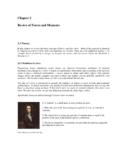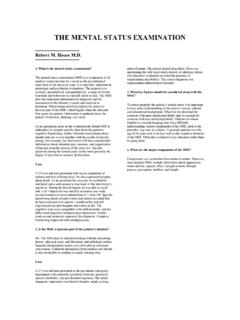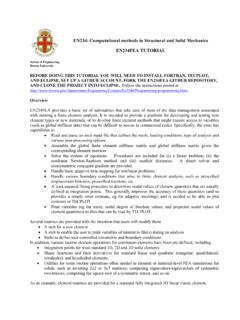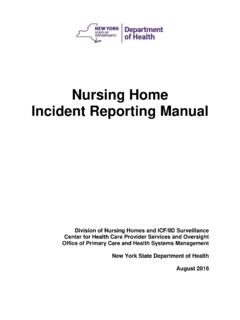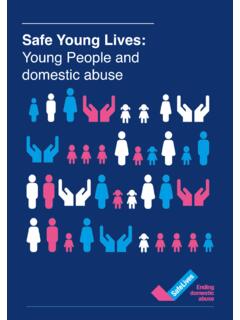Transcription of ETHICS AND THE DOCTOR - Brown University
1 1 ETHICS AND THE DOCTOR PATIENT RELATIONSHIP Claire Zilber The regimen I adopt shall be for the benefit of my patients according to my ability and judgment, and not for their hurt or any Whatsoever house I enter, there will I go for the benefit of the sick, refraining from all wrongdoing or corruption, and especially from any act of seduction, male or female . Oath of Hippocrates 1. What is a fiduciary relationship? The Hippocratic oath expresses the essence of the fiduciary relationship between a physician and each of his patients. The physician has a duty to act in the patient s best interest and to refrain from exploiting the patient. Respecting the fiduciary relationship and the trust of the patient is a cornerstone of the ethical physician s practice. 2. What is a boundary violation?
2 In the context of the physician patient relationship, a boundary violation refers to any behavior on the part of a physician that transgresses the limits of the professional relationship. Boundary violations have the potential to exploit or harm patients. Boundary violations differ from boundary crossings, which occur whenever the patient physician interaction goes beyond the usual therapeutic framework but is not necessarily harmful to a patient. For example, if a therapist happens to encounter a patient in a social setting, that is a boundary crossing but it is neither harmful nor unethical as long as the therapist does not violate confidentiality. However, if the therapist plans to meet the patient for dinner, it is a boundary violation. The potential areas of exploitation include personal or social boundary violations, business relationships, and sexual activity.
3 Examples of personal or social boundary violations include seeing patients in unorthodox settings for the convenience of the physician, loaning a patient money, or burdening the patient with personal information. Business ventures with a patient or taking advantage of insider information revealed by the patient are examples of unethical business relationships. Any form of sexual activity with a patient is a clear boundary violation. 3. A patient is looking for financial investors in a project that promises to be lucrative, and he invites the physician to invest in the project. May the physician ethically participate? The same patient gives a hot stock tip. Is it ethical to act on it? The ethical physician will not take advantage of either of these scenarios. In the first scenario, participation in a business relationship with the patient may harm the patient s treatment.
4 If the business fails, feelings of anger, guilt, or resentment may emerge between the physician and the patient. The physician may lose the objectivity necessary to provide competent and compassionate treatment if he or she resents having lost money as a result of the business venture. The patient may have similar negative feelings that make it difficult to seek help from the physician for medical problems. Even if the business succeeds, the physician is no longer an impartial and objective person for the patient. In the case of psychiatric treatment, the psychiatrist s relative neutrality and abstinence, central to the healing nature of the therapeutic relationship, cannot be preserved if a business relationship exists between the patient and psychiatrist. In the second scenario, the physician would be exploiting information furnished by the patient.
5 In addition, by acting on insider information, the physician may be breaking the law, which in itself is unethical behavior. This applies equally to psychiatrists and other physicians. 4. Why is sexual activity with a consenting adult patient considered unethical? Transference and countertransference are psychiatric concepts that help to explain why sexual activity, even with a consenting patient or former patient, is unethical. Transference is a phenomenon of unconscious displacement of earlier relationship experiences and expectations onto the physician and may cause a wide range of feelings in the patient, from rage to love and sexual attraction. Countertransference is the corresponding unconscious emotional reaction of the physician to the patient. Transference and countertransference may continue even after the termination of treatment; for this reason, psychiatrists may not ethically enter into a sexual relationship with a former patient, no matter how long ago the treatment ended.
6 Many consider the same dynamics applicable to other medical specialists and would extend the prohibition to all physicians. At present, the proscription against sexual activity with a former patient is unique to psychiatry, but sexual activity with a current patient is generally considered unethical in all fields of medicine. sexual activity with a patient damages the healing capacity of psychiatric treatment. One survey of psychiatrists found that 65% of those who had been sexually involved with patients felt that they were in love with the patient, and 92% believed that the patient was in love with them.[4] In fact, such feelings may have had their origins in transference and countertransference; by acting on the feelings rather than working in therapy to understand them, the psychiatrist harms the treatment and the fiduciary relationship.
7 Freud observed that it is deleterious to the patient if countertransference is acted out: If the patient s advances were returned, it would be a great triumph for her, but a complete defeat of the The love relationship, in fact, destroys the patient s susceptibility to influence from analytic treatment. 3 2 5. Are feelings of sexual attraction toward a patient unethical? No. sexual feelings toward a patient are quite common. In one survey, 87% of psychotherapists (95% of men and 76% of women) acknowledged having been sexually attracted to one or more of their patients. It is important not to act on such feelings. It may be helpful to seek supervision in the treatment of these patients to ensure that the sexual countertransference does not impede the treatment. 6. As you discuss a case with a colleague, she tells you that she has been trying a new approach with an emotionally needy patient.
8 She has extended the session time beyond the customary 45 minutes, seeing him at the end of the day for 1 hours. She also begins and ends each session with a hug, which she feels is necessary to assure the patient of her care and concern. Is this behavior ethical? This psychiatrist is sliding down the slippery slope of boundary crossings, but she probably has not yet behaved in an unethical manner. sexual transgressions frequently are preceded by such boundary crossings. Although some may say that no sexual activity has occurred, others may see the hugs as sexual . It is difficult to know whether the patient experiences the hugs as sexual . Even without the hugs, the circumstances under which the physician is seeing the patient are unorthodox and may harm the treatment. The psychiatrist is also at risk for a formal ethical complaint and a lawsuit.
9 Fifteen percent of lawsuits against psychiatrists involve sexual boundary violations. 7. A patient has just informed the physician of a plan to kill someone. The physician wants to ensure the other person s safety, but also is concerned about confidentiality. What may the physician ethically do? The Principles of Medical ETHICS direct physicians to safeguard patient confidence within the constraints of the law. The law requires the physician to warn the person at risk or to intervene so that no harm may be done. The ethical physician discloses only the information that is necessary and relevant to the situation. Fantasy material, sexual orientation, or other sensitive information usually does not need to be disclosed. The welfare and privacy of the patient should still be protected as much as possible.
10 Whenever possible, it is preferable to involve the patient in the ethical dilemma that the physician faces. For example, by working with the homicidal patient, the physician may be able to obtain a release of information from the patient to warn the person at risk or to persuade the patient to accept hospitalization until the homicidal ideation subsides. If the homicidal patient will not cooperate with the physician s efforts to ensure the safety of all involved, the physician is legally obligated to warn the person at risk. 8. A patient has been repeatedly resistant to treatment. He has missed numerous appointments, has not been following treatment recommendations, and is abrasive when the physician raises concerns about such behavior. Frustrated, the physician suggests that the patient seek treatment with someone else.
